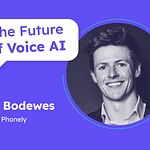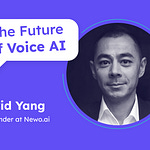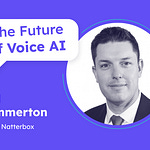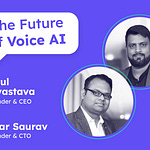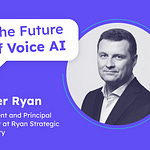In The Future of Voice AI series of interviews, I ask three questions to my guests:
- What problems do you currently see in Enterprise Voice AI?
- How does your company solve these problems?
- What solutions do you envision in the next 5 years?This episode’s guest is David Gu, Co-Founder & CEO at Recall AI.
David is CEO and co-founder of Recall.ai, the universal API for meeting bots. Prior to Recall.ai, David ran large scale meeting bot infrastructure at his last company, which led to him creating Recall.ai to solve this problem for every AI company.
Recall.ai offers APIs and infrastructure to access video, audio and metadata from video conferencing platforms like Zoom, Google Meet, and Microsoft Teams. Recall.ai's universal API abstracts away the complexity around integrating with a multitude of different platforms, and eliminates the toil of running large scale infrastructure to process meeting data in real time. This lets companies focus on building their core product. Today, Recall.ai serves hundreds of companies in industries such as sales, healthcare, legal, customer success, and more.
Recap Video
Takeaways
Universal API for Meeting Bots: Recall AI provides a universal API that enables developers to build and deploy meeting bots across various platforms (Zoom, Google Meet, Microsoft Teams, WebEx). The API offers real-time access to meeting data, including transcripts, video, and audio, simplifying the process of creating and managing meeting-related applications.
Background and Motivation: David and his co-founder experienced the challenges of building meeting data infrastructure firsthand in their previous company. They decided to create Recall to solve these infrastructure problems and support the development of innovative voice AI products.
Current Scale: Recall supports over 350 companies, processing millions of hours of audio and video data for millions of users, highlighting its growing impact in the voice AI industry.
Infrastructure Challenges: Building infrastructure for handling media data (audio, video, screen shares) is computationally intensive and complex. The shift towards real-time processing further complicates the infrastructure due to high demand at peak times, such as 9 a.m. Pacific time.
Transformation and Analysis: Recall transforms video data into an easy-to-use format for customers, facilitating AI analysis. For example, video streams are converted into still frames for AI processing.
Integrations: Recall partners with other companies for transcription and aims to integrate various AI models, including those for real-time transcription, to support a wide range of applications.
Flexibility and Customer Focus: Recall provides flexible infrastructure, allowing developers to choose the best models and tools for their specific needs. This approach supports diverse applications, from productivity tools to legal technology and telehealth.
Voice-Powered LLMs: While Recall currently focuses on infrastructure, there is an interest in integrating voice-powered LLMs (large language models) to enable new modes of interaction with software, making it more human-like and intuitive.
Company Vision: Recall aims to remove technical challenges associated with working with voice and video data, making it accessible and easy for companies to integrate into their applications. The goal is to harness the vast amount of data generated by remote work and voice communications.






